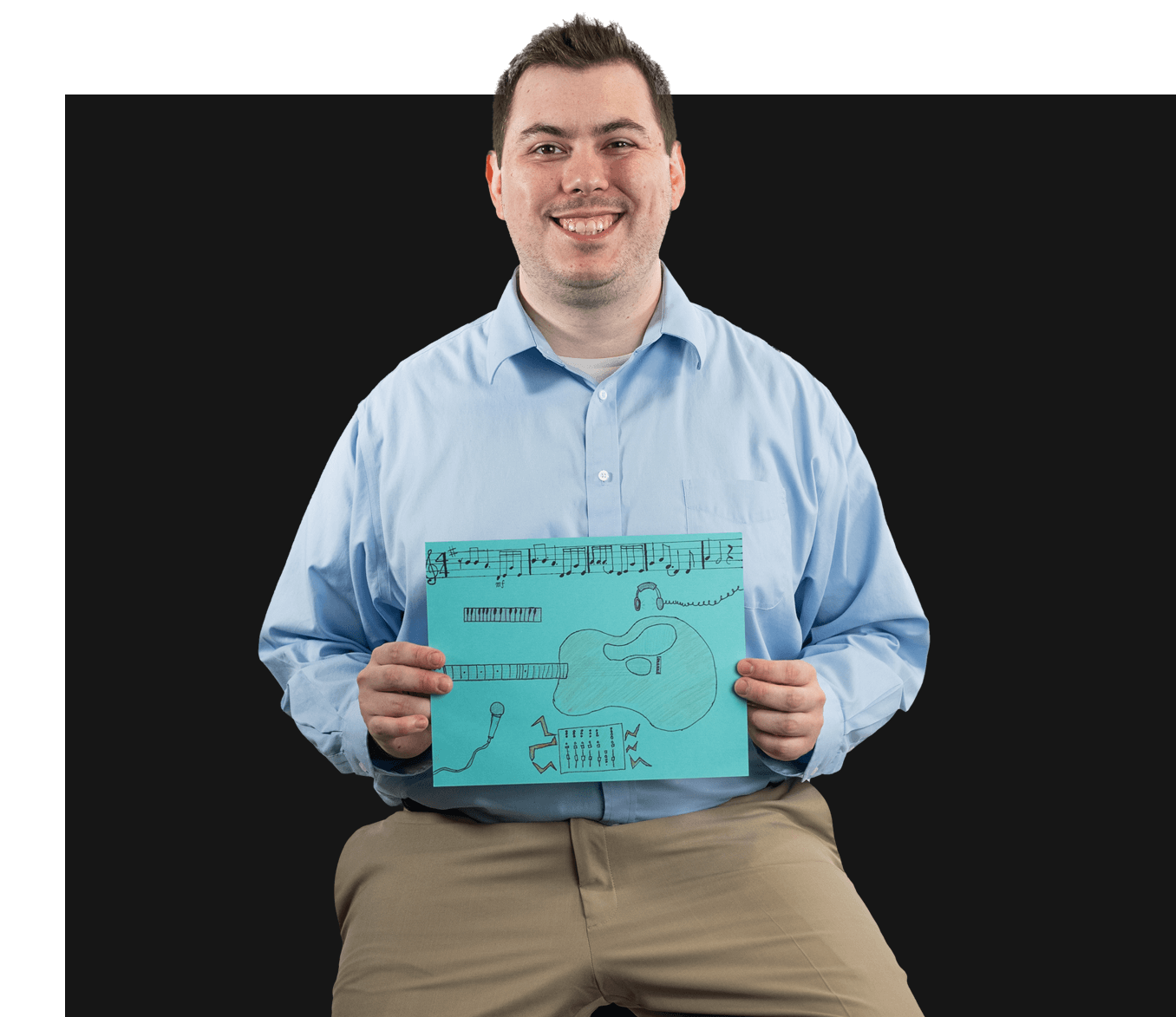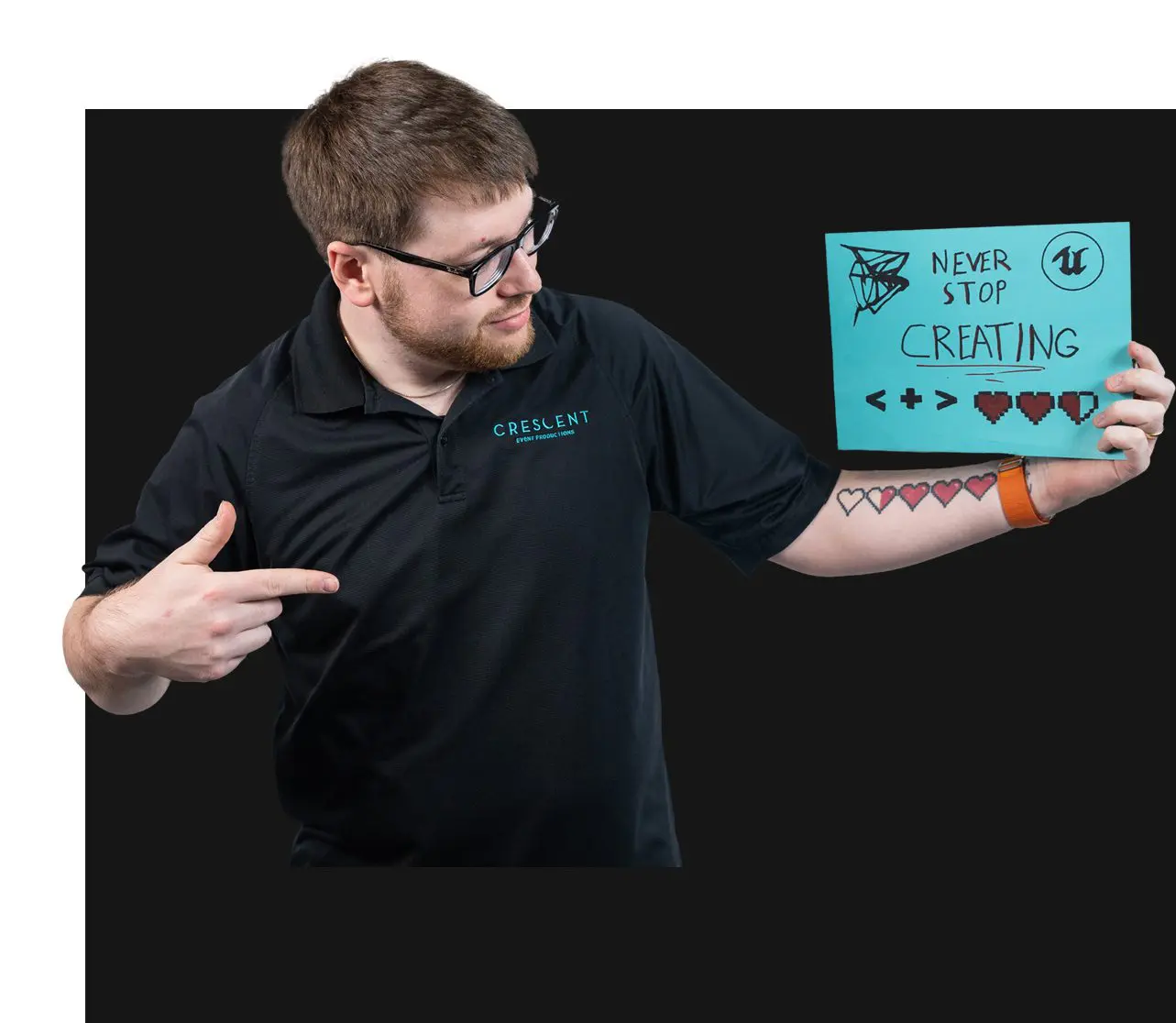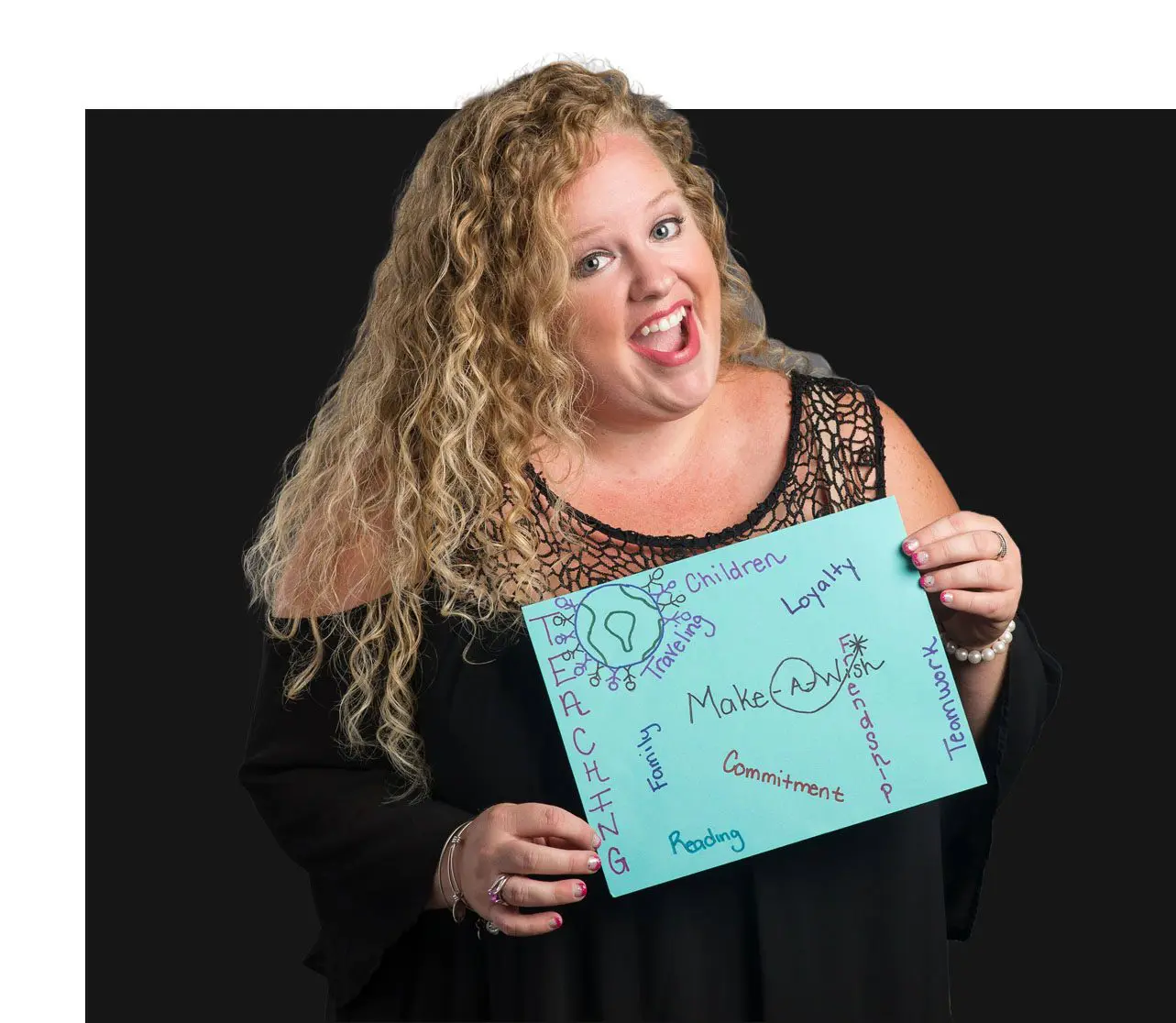In this interview, Chris Gerhart covers:
- how to know and understand the often confusing regulations for your local union venues
- how to ensure you have enough labor and quality workers for your event, so absolutely nothing falls through the cracks
- how to have a killer follow-up process to improve your success even more
Union Venues- How do you make sure you get quality AV Labor (part 1 of 3) Video Transcription:
Lara McCulloch: Welcome Chris. Really excited to have you on the show again. We are going to be talking all things union labor more specifically, we’re going to focus on how to get quality labor, right?
Chris Gerhart: Yes! Honestly, a lot of the things we’re going to talk about would apply to nonunion situations as well, but I think they’re more applicable because, in a union venue you have the limitation of basically being told here is a labor pool that you can draw from. Which we’ll touch upon at various points throughout this conversation and in future conversations.
It can be a good thing and it can be a bad thing. The purpose of this conversation is not by any means to bash unions. There are certain steps that can be taken when you have some limiting factors. Let’s say you have to work with this certain labor pool–there’re certain steps that can be taken to ensure that you get quality labor out of that pool, mitigate expenses and budget and scope creep. That’s primarily what we’re going to focus on here, but again, a lot of the stuff we’re going to talk about is most likely applicable in non-union situations as well, just more so in union situations.
Lara McCulloch: Awesome. You decided to focus on this topic because in the last few Facebook lives we touched a little bit on union labor and we got a lot of comments asking to go into this in more detail so here we are!
Chris Gerhart: Yeah, I would say to a lot of meeting planners AV in general is this kind of technical and abstract concept. Ultimately, they know what they want, but when you start looking at the quotes and the multitude of line items and everything else in there it can start to all run together. The labor side on most AV quotes is probably the most straightforward piece. Then when you get to a union event it’s no longer as straightforward. Understanding some of the nuances and differences that can help break that down and not have it be quite such an ominous thing is going to be key. The actual specifics of how the regulations work in each city and things like that we’re going to touch on more in a future Facebook live conversation, but again, just kind of understanding some of the nuances and differences that can help break that down and not have it be quite such, an ominous thing out there.
Lara McCulloch: Awesome, I know the way that you tackle this within your organization when you’re working with union labor is to look at the process from pre-event, during event and then post event. Do you want to break it down that way?
Chris Gerhart: Yes, let’s do that!
Lara McCulloch: Okay, cool. So why don’t you talk a little bit about some of the things that event planners or those working with the union labor should be looking out for thinking about pre-event.
Chris Gerhart: First and foremost, I think it’s imperative when doing venue contract negotiation while you’re looking for your host hotel or convention center for your event, be clear on whether or not audio visual labor is union or not, frankly, all departments. I mean my knowledge is obviously much more on the audio visual side of things, but I’d be aware of all departments because it can impact a multitude of aspects of your events.
I would say the key first step in the entire process is knowing whether or not it’s union, because what you don’t want to do is budget an entire show based upon last year’s event where it was nonunion and now you come here, you don’t ask the question, you aren’t clear whether or not the audio visual labor is union and now your budget is totally out of whack. One thing I can tell you and I hesitate to say 110%, but probably 95% to 99%, is that if you go to a union venue certain costs are going to go up. Again that’s not even an anti-union statement, I think that a lot of the benefits that are passed along to the union workers are great. Costs are going to go up, so just to be aware and then budget accordingly. There’re a lot of things you can do to help mitigate the budget, I’ll talk about those in more detail on this call and the next one, but just being clear up front, is the venue union? If it is, that is going to have an impact on my budget.
Lara McCulloch: Awesome, if we didn’t say this already, stay tuned for next Thursday, at 1:00PM Eastern, when we will be going into the next level of detail for union venues.
Okay, cool. Do you have an example of anything that has happened where you were able to either mitigate or you saw some of these challenges that you’ve talked about pre-event?
Chris Gerhart: Yeah. So, I’m going to be a broken record on some of these, but some of this we’ll go into more detail on the next live where we actually get into some of the policies.
As an example, we were doing an event in, I want to say it was in San Francisco. San Francisco has many venues, they’re not all union but many venues there are union. In San Francisco most of those venues do not require you to use their one sole payroller. So, the way the union labor works in the long and the short of it, the union itself dispatches the laborers. They are responsible for training the labor and managing the benefits for the laborers. Generally speaking, there’s a third party involved in actually paying that labor and then funneling the proper money into the various accounts, the retirement and pension, all the medical benefits, things like that for the union labor. San Francisco, as an example, does not require you to use one union payroller, and obviously for those payrollers to stay in business they have to make some money.
What they’re essentially doing is taking what the base rate is and putting a small markup on it to make their money, which is fair enough. But you don’t have to use one specific payroller–you can price shop. Shopping that rate a little bit can help mitigate costs. The beautiful thing of it is that has no bearing, no impact on the quality of the labor that you actually receive for the show because again, all that is being done by the payroller is putting in a labor call to the Union House and they’re dispatching the labor. So, the quality of the labor and the labor that’s being dispatched from the union is paid out of the money being paid to the payroller, and then back to the union house. That make sense? And because of that, it doesn’t really have a negative impact on the quality of your labor. You can still get great labor, but just by knowing your options and shopping it a little bit, you can often save a little bit of money in that regard.
Lara McCulloch: I’m totally unfamiliar with this process and there might be a few people who watch this video who might be unfamiliar as well. So how do you go about shopping the payment?
Chris Gerhart: So generally, we obviously have worked in many cities, I mean we do 100 to 150 events a year all over the country. You’ll find that a lot of cities tend to lean more heavily union, San Francisco, Las Vegas, Chicago, there are plenty of others. Often times because the cities are a little bit more unionized, sometimes it’s as simple as a Google search to give you that information. On our end because we’ve worked in these cities a lot we have preferential payrollers that we’ve worked with and we will go back to them and get rates and things of that nature. The other thing is you can always talk to your venue because oftentimes if they do require union labor, they can at least point you in the direction of a payroller option or two.
Lara McCulloch: And they’re called payrollers? I’m looking online.
Chris Gerhart: Yes, if I were searching it I might say San Francisco Union payroller. The union that tends to oversee audio visual labor is IATSE, so you might do IATSE union payroller San Francisco, in your search and you come up with a few options and you can call them and discuss rates and whatnot. Again, we’ll talk more on the next call about this, but there’re a multitude of ways that you can enter into the agreement with the union and how that can impact rates, whether or not you’re signing a one show agreement or an annual agreement or a multiyear agreement, and there’re implications to all of that.
If you do a one-year agreement, say in San Francisco, that covers the union’s jurisdiction, so even if you go to another venue in San Francisco that is non-union you’re still obligated to use the union labor, because you have an agreement that covers that whole jurisdiction. That said, you’ll get a little bit better rate on the union labor so it’s one of those tradeoffs. Do I have other events coming up in San Francisco at nonunion venues where I could actually in the long run, save a little bit of money by not being forced into using union labor at the second and the third and the fourth event, but on this first event I’m going to pay a little more because I’m just going to sign a single show agreement or am I not coming back here for the next year? So, it’s no harm to sign that one-year agreement, there’re a multitude of ways to look at it and things to juggle and balance.
Ultimately a key part of that process is breaking down all these different options and figuring out the best path forward for our customer to get quality labor, get everything that they need covered and making sure that the union is taken care of. Because ultimately having happy people on site is going to translate to a better-quality event and keeping cost as contained as possible.
Lara McCulloch: Okay, awesome. So, you’ve done all this pre-work, what can you do when the event is actually taking place or during the event?
Chris Gerhart: So, this is going to come down probably more so to the policies of the AV company you’re working with. If anybody has watched any of our other Facebook lives you will hear me constantly reference our goals are to be partners to our customers, in being a partner to our customer there often are times that we’re making decisions that are not necessarily in our best interest on a one show basis, but to ensure the longevity of our relationship with that particular customer.
For example, when we do an event at a union venue, it’s not uncommon for us to only charge for one lead to go in and oversee all the union labor, but if we have one lead going in to oversee 15 people, half of whom, maybe all of whom, we’ve not worked with before–they’re coming from the union in the local city–that could be too much for one person to manage successfully. And if you have a couple of bad apples in there from the labor that’s dispatched from the union you might have even more of an issue. So, we’d make the decision to send in enough key personnel on our team in most cases at no additional charge to the client, depending on what the union regulations are, keeping all that budget in check for the customer’s sake. But we send in enough key personnel to really take over certain positions of the show from the union if we have to.
It’s never the goal, but there’ve been a couple of instances where an audio engineer from the union is just not up to par for what we were promising to our customers; I wouldn’t even be able to pinpoint necessarily what particular city it was, so this is not to call out any specific unions or situations or events; we charge the client for one person to come in and oversee the event. We’ve also sent in two others and one of those happens to be strong with audio. What they’ll do is they’ll take over the role of audio engineer for that particular event. The union worker will still be on site, they’ll still get paid, they’ll just shadow our guy. They’ll basically just take a backseat role and our guy will actually run that particular portion of the event and it ensures a positive outcome for the client and doesn’t jack the rates up.
Lara McCulloch: Awesome. Okay. So, if I’m a planner, is the suggestion then to make sure that my AV company is doing that and sending that extra guy?
Chris Gerhart: Yeah, my best suggestion would be to make sure that happens. In most cases you’re not going to get that extra labor comp’d. It’s not common. Again, that goes back to whether or not the company is looking at what their margin on the equipment that they have is, or are they willing to look at the overall budget of the show on a full budget basis where they feel like they have to make their money in their equipment, and in their labor separately.
Those are just strategic decisions that we make to try and ensure the longevity of a partnership. If another company makes a similar decision, you might luck out and only get charged for the one guy, two guys or three (I say guys but guys or gals), and get the extra people there that help to ensure that success. But even if you don’t I think being open to the idea of being charged for that is better in the long run. It’s one of those things… it’s a live event, you have one chance to get it right. If you have key people, key personnel running that show– an audio engineer, video engineer, a lighting operator–and they drop the ball and you don’t have an answer for it, that’s a problem.
I’ve often felt that one of the things that makes us successful is less about the you know,
I mean obviously we run quality events, but I think that your ability to respond to issues that arise is probably more valuable to most customers then the idea that they never come up,because in a live event things do happen. But having the answer for what that audio guy; we thought he was good, he was doing great during rehearsals and then you just drop the ball; we’re going to swap them out with our guy. We’ve got the guy here, we’re covered as opposed to this kind of like, well, we have to work with them for the next three days because we don’t have anybody else here to take care of it. That to me is solutions oriented. Okay. We had an issue, let’s resolve it and move forward. And the other one is kind of like, Eh, I hope it works out.
Lara McCulloch: Right. Got It. Any examples or any stories of anything that’s happened that puts this into context?
Chris Gerhart: Yeah. So again, as I said at the top of this call, none of this is intended to be anti-union, one thing that I have felt, in fact, if anything, I think I feel quite the opposite.
If you can get quality labor, there are a lot of amazing benefits to it. It saves travel costs and lodging costs, it can work out well for everybody. There’s just the unknown of who you are getting. One of the things that we’ll talk about when we get to our post event processes is how we ensure quality labor for the next event. One of the keys is coming in and working as a team. If you come into a union venue, even if the rate’s a little higher, even if it was a challenge during the planning process, and even if there are tons of regulations and red tape, you have to kind of tiptoe around and make sure you don’t have any issues. They’re still human beings, they’re still there to do a job for you, and they’ll respond to how they’re treated. So, come in and work as a team. It’s funny because we’ve done shows before where everybody had that mentality except maybe one guy from the union.
What was interesting in one instance I recall the other union members actually came to us and said, “Hey, I think you need to get this guy off the event.” He was talking about one of their own union members, but he said, he doesn’t have a good attitude, he’s not pulling his weight, we’re not getting things done at the pace we should be. It was one of those eye-opening moments, like wow, if we plan this right and they feel comfortable with the plan we put together, explain it clearly upfront and then it’s not going according to plan oftentimes, like I said, they want to see it succeed just as much as the next person. So let’s work together towards a common, positive outcome.
I think it’s easy to adopt a mindset of an US versus THEM mentality, which we really try to avoid when we’re working with union labor. Again, for that very reason, I just said, you’ve got to show to accomplish, we all have one common goal. Let’s make it successful together.
Lara McCulloch: I love that!
So before we go into post event, I think what you just talked about there was a really, really juicy, really interesting point in there, which is oftentimes I would imagine, either AV companies see union labor as US versus THEM or even the planner sees the union labor as US versus THEM. But what you’ve talked about is integrating, communication processes and procedures in a really clear direction as to why we’re doing the event that we’re doing.
I think bridging that divide and making sure that everybody kind of understands we’re all working to the same end goal and we’re working on this together is actually a really, really great, nuanced point!
Chris Gerhart: Yeah. It is nuanced, but it’s almost sad that it is because when you do a union event it probably costs you a little bit higher. But at the end of the day once you work through that and get a budget, get it paid for, at the end of the day you still want a successful event. That nuanced point is the difference between a successful outcome and not, and frankly it’s also the difference between budget scope creep.
You talk about the budget, how it’s a little bit higher but how can you avoid it going higher? When those union techs came to us and said, hey, this guy’s not pulling his weight, he has a bad attitude, everything else, well part of not pulling your weight could include working slower and therefore we’re going to run into overtime and things that aren’t budgeted for. It shouldn’t be happening. If we had four guys and one of them is not pulling his weight, we’re losing time on a quarter of our labor. On that particular show we had a lot more guys and this particular one didn’t have necessarily the ability to offset it that much, but still it was just neat to see that it was no longer US versus THEM. It was, hey, we’re all in this together, we’ve got a problem here, let’s resolve it.
Lara McCulloch: Awesome. Okay, now let’s jump to post events. So, you have had the event, is there anything that you can do in this part of the process?
Chris Gerhart: Yeah, and this is probably the key part that is applicable to every single event union or not, that is having a debrief on as many aspects of the event as possible, but labor very specifically. Because one of the great parts about union is, when you go back to a city, there’s a strong possibility that the same people you worked with are going to be there, I guess, good or bad, right? So, if they’re bad you want to know that and be able to say to the Union Hall and the dispatching: we don’t want these guys or these gals there; and if they’re amazing: we definitely want these ones there. I’ll have to actually look back at some of the policies and procedures from some of the different union city contracts that we’ve been involved with but in some cases, you can actually spend a little bit more money to request specific techs. I can tell you it’s worth its weight in gold because it’s not that much more. I have to look but I think in most cases it’s actually the payroller doing that markup, not the union hall, but again, it’s worth its weight in gold, if you have five-star people.
When we come back from an event, union or not, we rank all of our labor on a five-star basis. If they don’t get a five, then we have to give reasons why, I want to know why they get a four and maybe just not put them in that position again. Let’s set them up for success so that they can be happier and more successful. Maybe they got a four because they didn’t have a tremendous amount of knowledge in a particular area. Knowing that we can say, “hey, come down to our warehouse, let us teach you because we’d love to have you back you had a great attitude, you worked hard, but we need you to improve in the skillset and we’ll work with you on that.” But, obviously when we get down to zeros, ones and twos, you’re probably not going to be invited back and that’s to the benefit of the next show.
So in that post event debriefing and ranking of the team so we have their information maintained in our database. We keep a database of our tech, their name, the city they work in and their skill sets. We keep track of what position they are hired for on each show, hired for an audio engineer or hired to be a video engineer and then their ranking so we could say, okay, so and so was hired to be an audio engineer on this show and they have a five star ranking, they were hired to be a video engineer on this show and they were a two star ranking and then the notes might say amazing attitude, just not super qualified on video. Okay, fine. Then we know that person’s a great option for audio.
That kind of follow up in detail presents the value to that same client going back to that city in the future, or any of our other clients going back that city in the future. I would say that with us doing 120 to 150, somewhere in that range, events a year not even half of them are union venues. Probably maybe a quarter are at union venues, but every single client of ours that goes to union venue gets the benefit of the other 30 or 40 events we do a year, and the experience we have with that, and then the database of people we have, good or bad, to help make sure that we end up with quality labor onsite.
Lara McCulloch: So this is really fascinating to me because I think that the biggest nugget that I got from that was that database of making it a part of the process to really understand who are the union people who are working on this job, understanding the criteria that you’re going to rank them by, and then taking those notes post event to make sure that you request the five stars back or you take a look at those four stars and figure out what’s going on. So, you mentioned that, there’s usually a cost associated with it, but you can invite certain people back. Can you disinvite or make that certain people are not on your team?
Chris Gerhart: Absolutely, I’ve never gotten push back from a union hall, a payroller anybody making a request to not have somebody there. In many cases what will happen is we’ll come back to a city where I need, let’s say four audio engineers, I want to make a specific request on three of them, I don’t have a fourth that I know yet in that city that I want. So, what I’ll do is say I want these three techs, I definitely don’t want these two techs and then fill the gap with the other guy and now hopefully that new person is a five or a four star something pretty high, and now we’ve got our next guy for the next time we go to that city.
Lara McCulloch: Awesome. So, I’m wondering if I was watching this and I want to hear from everybody who watches this video, if you have any suggestions either for where we should drill down on a certain topic or if there’s any type of giveaway that would help make your job easier.
As we’ve mentioned in previous Facebook lives, we always give something away in our videos, whether it’s a cheat sheet, a checklist or a detailed list. Where my mind is going, it would be amazing Chris, if you could share your criteria for ranking those union labor techs, that would be really helpful.
Chris Gerhart: Absolutely, we can do that. We basically have a form that we fill out and again, it kind of helps to identify the strengths, the weaknesses and again, all in a constructive manner. It’s not meant to be negative. The reality is we would love to be able to give all five stars, but at the end of the day, what we need more than that is to make sure that the client has a good experience.
Lara McCulloch: Yeah! So, we’ll call it the union labor scorecard. If you guys watching this would love to get ahold of a Union Labor scorecard give us a thumbs up. That way we know to send it to you. We’ll reach out to you and we’ll arrange to get that in your hands.
All right, so let’s wrap this up. This is a really good meaty discussion. We got some good tidbits in here. What are your top three takeaways for everybody watching?
Chris Gerhart: Yeah, I’d just summarize the three areas we’ve talked about the pre-event, onsite and post event work. The number one would be knowing the regulations, being clear again from the get go, is it a union venue? But then what are the regulations of the union, some unions are stricter than others, some require one union tech for every one technician that is nonunion that you brought in from outside, other unions might say no, you can send in a lead and then everything else is union. So just knowing those regulations all the way down to knowing when meal penalties kick in, how do they bill and what happens if you have an event that goes for five, six or seven days, how does it change rates? What happens if you have a call time before 7:00 AM or after midnight and a lot of those policies, when we get to them on the next Facebook live, they’re specific to each city, in each union they all kind of have the general same framework, but whether the increased rate is from 6:00 AM or 7:00 AM, those things can vary from city to city. Just being aware of them, I think is key.
One thing I didn’t actually touch upon in the onsite portion and it’s a crossover of the pre-event to onsite. We put together an insanely detailed labor schedule when we have union labor involved, the reality is we work to virtually no end to try and put the right labor plan in place for all of our events obviously, but when there’s union involved and you literally have the difference of them getting a break at this time or getting a break half an hour later could cost a lot of money, which is generally not the case at nonunion shows where you have a little bit of flexibility. This schedule that we put together has to be perfect and you have to follow to a “T”. So that schedule literally says, here’s the position, here’s when they come in, here’s when they get their first break, 15 minutes later they come back, here’s when they get their lunch and here’s where they come back from lunch, all the way through the end of the day and here’s what they’re going to do, every segment of that day. It’s a painful process to put together but it provides a lot of value.
Going in to key takeaway number two, is having an amazingly detailed plan and making sure that you have enough labor from your AV company on site to support that plan. If it’s a two person show, chances are the AV company can send one person on site and you’re covered. But if it’s a 10 person show, or 15 or 20 people show, sending one person in to oversee a crew of 20, it’s just not going to be effective. If you start to have problems you’re not going to be able to keep ahead of them and you’re going to be chasing your tail throughout the entire event. So, key takeaway number two is having a detailed plan and then enough team members from the audio visual company to help you facilitate and coordinate that plan.
The third takeaway would be having a really, really detailed follow up process, after the event ,ideally with your AV Company, so you can share the good, the bad, the ugly from the event. If you’re the client, the meeting planner, hey, I don’t even know whether or not this technician knew what they were doing technically that’s more for the AV company to make that determination, but this guy had a great attitude I’d love to see them back, this person was a little bit rough around the edges I’d rather not see them. Having that conversation so that at a future event that you do in that city you’re clear on who you might want and who you might not. If you have an AV company that you work with ongoing, that you have a partnership with then, you guys have shared notes and that experience and can obviously grow and expand from there.
Lara McCulloch: Okay. So, I want to touch on one other thing that’s really important if you do want that union labor scorecard I had originally said give me a thumbs up. Unfortunately, I think there was a couple of likes on the video and I can’t measure those. So that was my fault. I should have asked instead if you could just write yes in the comments, just like event profs happened to do, which is awesome. So, just write, Yes, yes, please. Yes, I’d like it.
Well this was great. I think this was a really good, first of we’re doing three videos, right? So, we’re going to be meeting again next Thursday at 1:00 PM Eastern Standard time and we’re going to drill down on some of those regulations.
Chris Gerhart: Yes! Again, we’re going to talk about the general framework for those regulations because they vary from city to city, but the framework of them doesn’t. If anybody has questions related to policies or things that they might have seen before at events if you’re a planner, if you’re an AV industry, whatever the case is, you can post questions like that on this thread and we can respond to you in advance and we can also use that as some more information to share on the next Facebook live. So, feel free to do that, yeah, and we’ll obviously go through those.
Lara McCulloch: Yeah, great suggestion. And if you have any suggestions, I asked this with almost every video you have any suggestions for future topics that you would like to learn more about as it relates to the world of AV. Please leave us a comment and we will be sure to consider it and figure out how we can work it into future Facebook lives.
Thank you everybody who participated, gave us a thumbs up, gave us a heart and gave us a comment. Much appreciated. Thanks guys.
Chris Gerhart: Thanks guys!




























